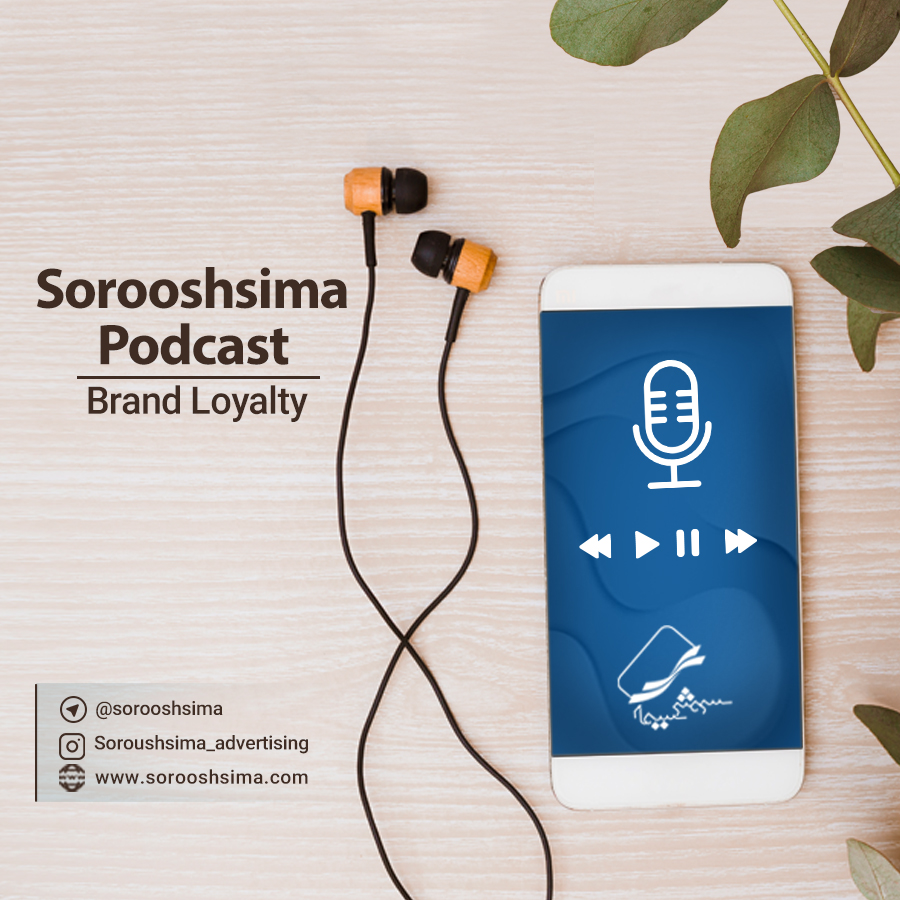Sorooshsima Podcast #21
Brand Loyalty
 Hi Sorooshsima Podcast listeners
Hi Sorooshsima Podcast listeners
We all deal with words like loyalty and support and their meaning in our daily lives. But can we be loyal to a brand? What exactly does brand loyalty mean?
Loyalty is a positive term. In the Oxford Dictionary, loyalism means being loyal to a person or thing and the word loyal means the steady firm support of an entity, business or other person.
Richard Oliver’s definition of customer loyalty is a strong commitment by a customer to repurchase of a product or superior service in the future, even with other competitors.
In the last decade, attention to brand loyalty has increased significantly and nowadays loyalty is considered as a parameter for increasing revenue. Until just a few years ago, the company’s major concern was finding and attracting more customers. Nowadays, maintaining and satisfying customers, is one of the most important business activities. In this regard, concepts such as customer satisfaction management, comprehensive quality management, six sigma approach, etc. have been implemented in companies.
Branding is a sensitive issue and the opportunity to create customer satisfaction is not easy to achieve. Loyalty can be gained but the organization must constantly focus on this issue, however, creating loyalty for all customers is impossible. Today the number of satisfied customers who turn away from companies is not low. Different studies show that the cost of acquiring or attracting a new customer is approximately seven times more than keeping the current ones. That is why organizations strive to maintain their existing customers and build loyalty in them.
Brand Loyalty or disloyalty, is a behavior that each of us has somehow experienced in our own behavior or that of our surroundings. Customer commitment is the result of an organization providing benefits that lead to the customer making purchases from it and that commitment is real when the customer is motivated to buy without any advertising or encouragement. There should be a win-win relationship between the customer and organization, so both can feel they have benefits and entice each other. Be careful that brand loyalty is often about a specific product category and not a company.
Brand loyalty develops when the customer feels that brand he/she is looking for in addition to having the right features and quality, it is well priced, and despite the low price, the customer still buys the same brand.
Brand loyalty is measured through techniques such as word of mouth advertising, continuous shopping, price sensitivity, brand trust, customer satisfaction and so on.
Marketing science professionals and experts point out the many benefits of loyalty and some of the most prominent ones are:
- Reducing the cost of attracting new customers
- Reducing customer sensitivity to changes and prices
- Benefits from the customers lifetime value
- Positive performance through increased predictive power
- Increase barriers for influx of new competitors
Trademark and its role in loyalty:
A trademark is a name, term, sign, design or trademark used to identify a product or services of a manufacturer and to differentiate each manufacturer from competitors. A trademark must include functional and emotional components that establish a relationship between the customer, that product or service.
Trademark features can be either negative or positive and can create different levels of significance and communication between markets and customers with different cultures.
A trademark has unique identity and characteristics that are separate from the company and the brand name. Each trademark is a special and specific name that can be derived from the name of a community, city, group or an individual. Even your name can be a trademark. In fact, a trademark should be so big in our minds that when we hear the name of the product or service, it immediately becomes apparent to us. Nowadays, corporate executives understand that their company’s trademark is not a senseless name but is considered a thoughtful asset and wealth to the company.
A trademark increases customer loyalty. Since the customers often choose names that they know, it is presumed that customer loyalty is more to approved trademarks. A strong trademark makes it possible to enter the market. Organizations with strong trademarks are far more successful in entering the new market.
Difference between customer satisfaction and customer loyalty
It’s best not to get confused, first let’s define each these two terms. As we explained, loyalty means being committed to person or thing and satisfaction means pleased, like and desire. So as the two concepts imply, there is a difference between satisfaction and loyalty.
In terms of loyalty, Philip Cutler divides customers into four categories:
Hardcore Customers:
These type of customers always prefer a “Specific Brand” in their purchases and decisions, having the experience of using and trusting that brand.
Split Loyals:
This group of customers are loyal to two or three specific brands, for example when buying a cellphone, they introduce Samsung and IPhone to others.
Shifting Loyals:
Loyalty to a brand is one of the personal traits of this type of customers, but they may be loyal to a brand during a specific period.
Disloyal or Switchers:
For their purchase or decisions, they make independent decisions. These customers may simply change their minds based on price, variety or recommendation from others.
Why is brand loyalty so important?
There are three main reasons to answer this question:
- Increased Sales: US companies that lose half of their customers in five years, lose and compensate 130% annually due to these losses. These statistics show challenges companies face in a growing competitive environment. Achieving a 1% annual growth rate requires an annual increase of 14% in sales to current and new customers. Losing customers can dramatically improve business growth and brand loyalty, which leads to steady or increased sales with increased repeat purchase of that brand.
- Ability to raise prices: as brand loyalty increases, customers become less susceptible to price changes. Customers may not say anything about their preferred or more expensive brand. Because they have seen unique values in that brand or trademark that other competitors don’t offer.
- The importance of keeping customers: Brand Loyalist tend to search for their own brand and are less sensitive to market competition. The result is lower cost for distribution, completion and marketing. Branding is a sensitive subject and getting the opportunity to create customers loyalty is not an easy task.
